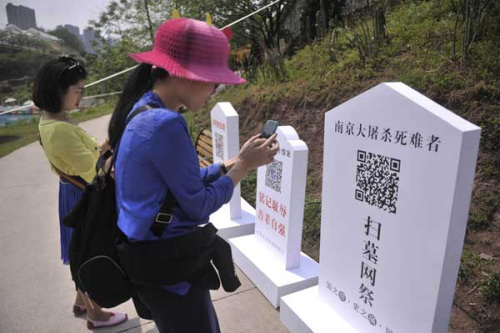
Visitors to a cemetery scan QR codes on tombstones. (China Daily/Chen Chao)
Qingming Festival, also known as Tomb Sweeping Day, is a festival in which Chinese pay homage to their deceased loved ones.
Family members clear the weeds around the tombs, burn incense and make traditional paper offerings, such as paper money, at the grave sites.
But Wei Zeyun, a 27-year-old from Beijing, will pay tribute to her deceased godfather by visiting his online memorial hall instead of making a trip to his grave.
She has been using the online homage service since her godfather passed away in 2003.
"My godfather watched me grow up, and I always remember how well he treated me," Wei says.
"He was a man of great social status and connections, but I have no blood connection with him. If I go to his grave to demonstrate my filial piety and respect, it probably will seem strange to other people.
"The online homage service gives me a new channel to pay tribute to him without causing inconveniences."
Wei is one of a growing number of Chinese who have ceased observing the traditional Qingming Festival rituals and instead pay homage to deceased ancestors online.
With a few clicks of a mouse, users can build online memorial halls for their deceased loved ones using online homage websites.
Online users can post photos of the dead, write the stories of their life, upload videos and express their grief by adding letters and funeral songs to the virtual halls.
They can also present things the deceased enjoyed in life, such as alcohol, cigarettes and flowers and even burn virtual incense and paper offerings.
The users can also send the website links to the deceased person's friends and relatives for them to gather in the cyber world to honor the dead.
According to Huang Xinwu, a Guangzhou resident in Guangdong province who created one of China's largest and earliest online homage service websites, tiantang6.com, the trend of paying homage online first emerged about 15 years ago and there are now more than 1,000 such services.
Huang founded his website in 2006. It attracts millions of visits every year. The websites get more visits during festivals such as Qingming Festival and Mid-Autumn Festival or when a celebrity dies or a disaster strikes.
Most of the online users are people born after 1960, especially people in their 30s and 40s, which Huang says is probably because they have easy access to the Internet and a greater possibility of having lost a family member.
Users from east coast cities also outnumber those from western China. Big cities also have more users of the service than small cities and rural areas.
About 16 percent of his website users are from overseas, including the United Kingdom, the United States and Canada, Huang says.
People use online homage services for various reasons, mostly because it is a low-cost and low-carbon way to pay tribute to the dead, compared with the traditional way.
Qi Qi, 28, a Guangdong province native who lives in Beijing, says he uses online homage services because he cannot return to his hometown during Qingming Festival. He was raised by his grandparents and he grieved deeply for their deaths, but it is too time consuming and inconvenient to travel to Guangdong during the three-day holiday just to make a special pilgrimage to the cemetery.
He is also concerned about the environmental impact of the traditional homage rituals.
There have been frequent headlines in recent years that air pollution and accidental fires have become a growing problem during Qingming Festival because Chinese burn large amounts of paper money at grave sites.
However, despite the growing online trend, many people are still skeptical about the service.
Wei Zeyun, the Beijing native, says she visits her family's cemetery every year to honor the dead in her family, because she considers online homage only an alternative when it is impossible to visit the cemetery. She says such visits can also be low carbon if people stop burning paper offerings, and pay tribute simply with their presence.
















































